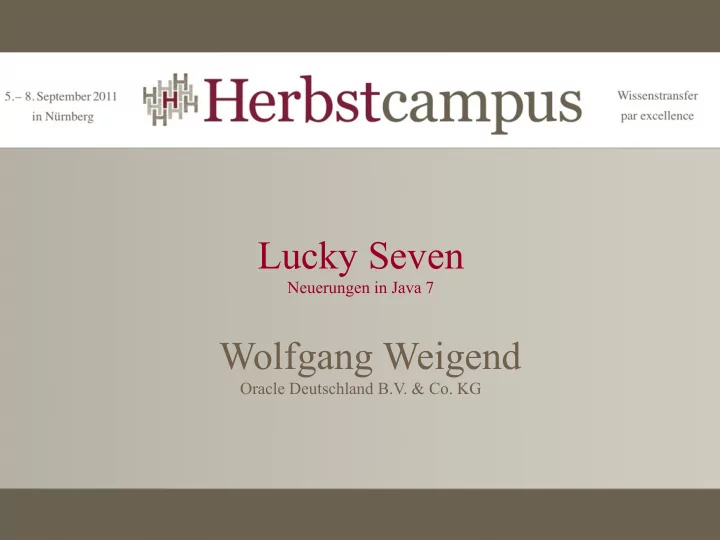

Lucky Seven Neuerungen in Java 7 Wolfgang Weigend Oracle Deutschland B.V. & Co. KG
P Neuerungen�in�Java�7 <Insert�Picture�Here> Die�wichtigsten� Änderungen,�Erweiterungen ����������� Wolfgang�Weigend Systemberater�Java�Technologie�und�Architektur
Priorities�for�the�Java�Platforms Grow�Developer�Base Grow�Adoption Increase�Competitiveness Increase�Competitiveness Adapt�to�change
Java�Communities
How�Java�Evolves�and�Adapts Community�Development�of� Java�Technology�Specifications
JCP�Reforms • Developers � voice�in�the�Executive�Committee • SOUJava • Goldman�Sachs • London�JavaCommunity • Alex�Terrazas • JCP�starting�a�program�of�reform • JCP�starting�a�program�of�reform • JSR�348:�Towards�a�new�version�of�the�JCP
Evolving�the�Language From�“Evolving�the�Java�Language” - JavaOne�2005 • Java�language�principles – Reading�is�more�important�than�writing – Code�should�be�a�joy�to�read – The�language�should�not�hide�what�is�happening – Code�should�do�what�it�seems�to�do – Simplicity�matters – Every�“good” feature�adds�more�“bad” weight – Every�“good” feature�adds�more�“bad” weight – Sometimes�it�is�best�to�leave�things�out • One�language:�with�the�same�meaning�everywhere • No�dialects • We�will�evolve�the�Java�language • But�cautiously,�with�a�long�term�view • “first�do�no�harm” 6 6
So�you�want�to�change�the�language? 7 7
Java�SE�7�Release�Contents • Java�Language • Project�Coin�(JSR-334) • Class�Libraries • NIO2�(JSR-203) • • Fork-Join�framework,�ParallelArray (JSR-166y) Fork-Join�framework,�ParallelArray (JSR-166y) • Java�Virtual�Machine • The�DaVinci Machine�project�(JSR-292) • InvokeDynamic bytecode • Miscellaneous�Things • JSR-336:�Java�SE�7�Release�Contents 8 8
Small Small <Insert�Picture�Here> Section Divider Language Language Language Language Changes Changes Project�Coin Project�Coin 9 9
Project�Coin�Constraints • Small language�changes • Small�in�specification,�implementation,�testing • No�new�keywords! • Wary�of�type�system�changes • Coordinate�with�larger�language�changes Coordinate�with�larger�language�changes – Project�Lambda – Modularity • One�language,�one�javac 10 10
Better�Integer�Literal • Binary�literals int�mask�=�0b101010101010; • With�underscores�for�clarity int�mask�=�0b1010_1010_1010; long�big�=�9_223_783_036_967_937L; 11 11
String�Switch�Statement • Today�case�label�includes�integer�constants�and� enum�constants • Strings�are�constants�too�(immutable) 12 12
Distinguish�Strings�Today int�monthNameToDays(String�s,�int�year)�{ if("April".equals(s)�||�"June".equals(s)�|| "September".equals(s)�||"November".equals(s)) return�30; if("January".equals(s)�||�"March".equals(s)�|| if("January".equals(s)�||�"March".equals(s)�|| "May".equals(s)�||�"July".equals(s)�|| "August".equals(s)�||�"December".equals(s)) return�31; if("February".equals(s)) ... 13 13
Strings�in�Switch�Statements int�monthNameToDays(String�s,�int�year)�{ switch(s)�{ case�"April":�case�"June": case�"September":�case�"November": return�30; case�"January":�case�"March": case�"May":�case�"July": case�"August":�case�"December": return�31; case�"February”: ... default: ... 14 14
Simplifying�Generics • Pre-generics List�strList�=�new�ArrayList(); 15 15
Simplifying�Generics • Pre-generics List�strList�=�new�ArrayList(); • With�Generics List<String> strList�=�new�ArrayList<String>(); List<String> strList�=�new�ArrayList<String>(); 16 16
Simplifying�Generics • Pre-generics List�strList�=�new�ArrayList(); • With�Generics List<String> strList�=�new�ArrayList<String>(); List<String> strList�=�new�ArrayList<String>(); List<Map<String,�List<String>> strList�= new�ArrayList<Map<String,�List<String>>(); 17 17
Diamond�Operator • Pre-generics List�strList�=�new�ArrayList(); • With�Generics List<String> strList�=�new�ArrayList<String>(); List<Map<String,�List<String>> strList�= new�ArrayList<Map<String,�List<String>>(); • With�diamond�( <> )�compiler�infers�type List<String> strList�=�new�ArrayList<>(); List<Map<String,�List<String>> strList�= new�ArrayList<>(); 18 18
Copying�a�File InputStream�in�=�new�FileInputStream(src); OutputStream�out�=�new�FileOutputStream(dest); byte[]�buf�=�new�byte[8192]; int�n; while�(n�=�in.read(buf))�>=�0) out.write(buf,�0,�n); 19 19
Copying�a�File�(Better,�but�wrong) InputStream�in�=�new�FileInputStream(src); OutputStream�out�=�new�FileOutputStream(dest); try�{ byte[]�buf�=�new�byte[8192]; int�n; while�(n�=�in.read(buf))�>=�0) out.write(buf,�0,�n); }�finally�{ in.close(); out.close(); } 20 20
Copying�a�File�(Correct,�but�complex) InputStream�in�=�new�FileInputStream(src); try�{ OutputStream�out�=�new�FileOutputStream(dest); try�{ byte[]�buf�=�new�byte[8192]; int�n; while�(n�=�in.read(buf))�>=�0) while�(n�=�in.read(buf))�>=�0) out.write(buf,�0,�n); }�finally�{ out.close(); } }�finally�{ in.close(); } 21 21
Copying�a�File�(Correct,�but�complex) InputStream�in�=�new�FileInputStream(src); try�{ OutputStream�out�=�new�FileOutputStream(dest); try�{ byte[]�buf�=�new�byte[8192]; int�n; while�(n�=�in.read(buf))�>=�0) while�(n�=�in.read(buf))�>=�0) out.write(buf,�0,�n); }�finally�{ out.close(); } Exception�thrown�from }�finally�{ potentially�three�places. in.close(); Details�of�first�two�could�be�lost� } 22 22
Automatic�Resource�Management try�(InputStream�in�=�new�FileInputStream(src), OutputStream�out�=�new�FileOutputStream(dest)) { byte[]�buf�=�new�byte[8192]; int�n; while�(n�=�in.read(buf))�>=�0) while�(n�=�in.read(buf))�>=�0) out.write(buf,�0,�n); } 23 23
The�Details • Compiler�de-sugars�try-with-resources�into�nested�try- finally�blocks�with�variables�to�track�exception�state • Suppressed�exceptions�are�recorded�for�posterity� using�a�new�facility�of�Throwable • API�support�in�JDK�7 • API�support�in�JDK�7 • New�superinterface� java.lang.AutoCloseable • All� AutoCloseable and�by�extension�java.io.Closeable�types� useable�with�try-with-resources • Anything�with�a���� void�close() method�is�a�candidate • JDBC�4.1�retro-fitted�as� AutoCloseable too 24 24
More�Informative�Backtraces java.io.IOException� at�Suppress.write(Suppress.java:19)� at�Suppress.main(Suppress.java:8)� Suppressed:� java.io.IOException at Suppress.close(Suppress.java:24) at Suppress.close(Suppress.java:24) at Suppress.main(Suppress.java:9)� Suppressed:� java.io.IOException at� Suppress.close(Suppress.java:24)� at� Suppress.main(Suppress.java:9) 25 25
Varargs�Warnings class�Test�{� public�static�void�main(String...�args)�{ List<List<String>>�monthsInTwoLanguages�=� Arrays.asList(Arrays.asList("January", "February"),� Arrays.asList("Enero", "Febrero"�)); } } Test.java:7:� warning: [unchecked]� unchecked� generic� array� creation� for� varargs�parameter� of� type� List<String>[]�������� Arrays.asList(Arrays.asList("January", ^ 1� warning 26 26
Heap�Pollution�– JLSv3�4.12.2.1 • A�variable�of�a�parameterized�type�refers�to�an�object� that�is�not�of�that�parameterized�type • For�example,�the�variable�of�type� List<String>[]� might�point�to�an�array�of� List s�where�the� List s�did� not�contain�strings not�contain�strings • Reports�possible�locations�of� ClassCastExceptions at�runtime • A�consequence�of�erasure • Possibly�properly�addressed�by�reification�in�the�future 27 27
Recommend
More recommend